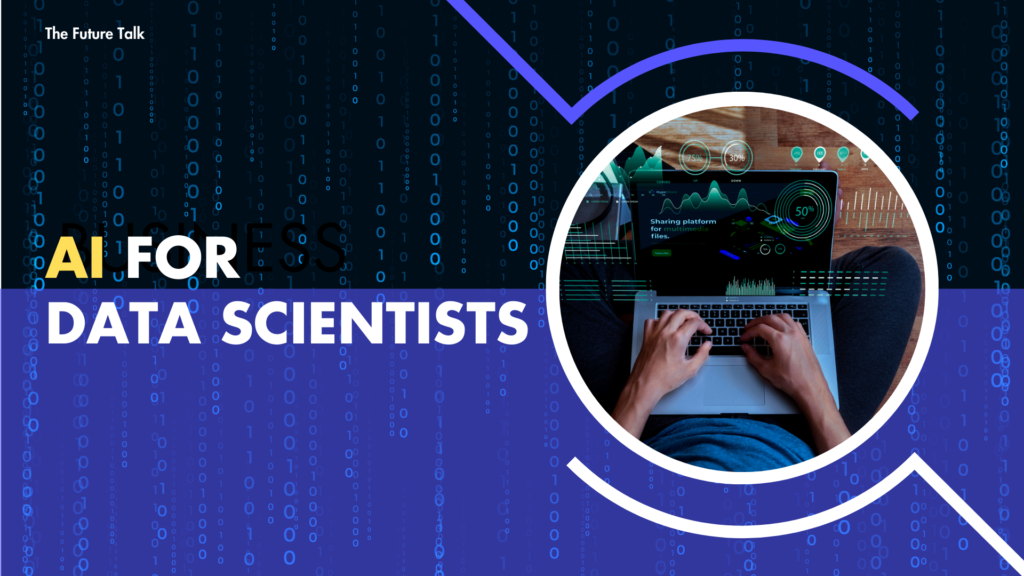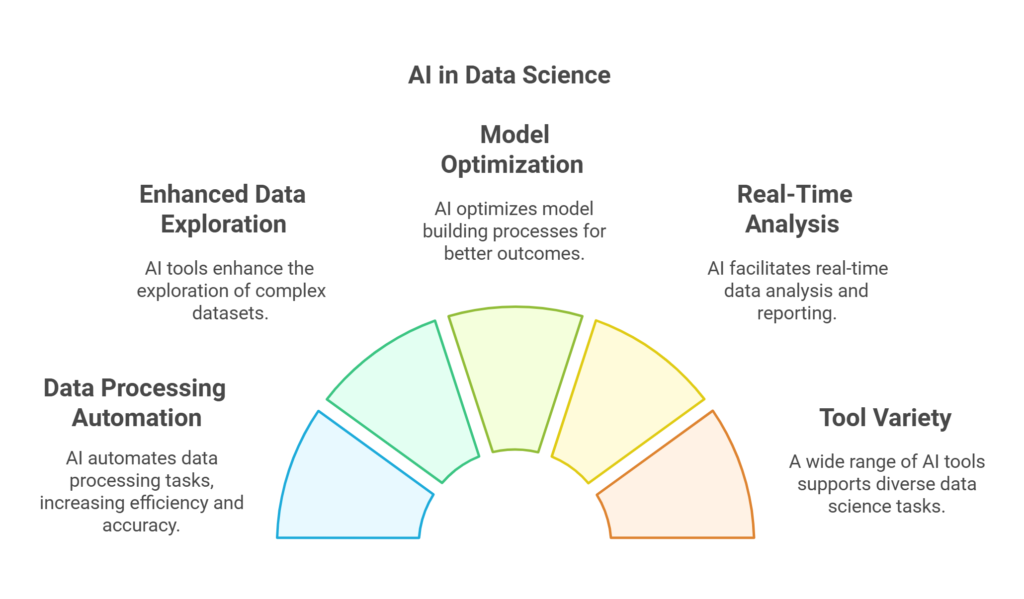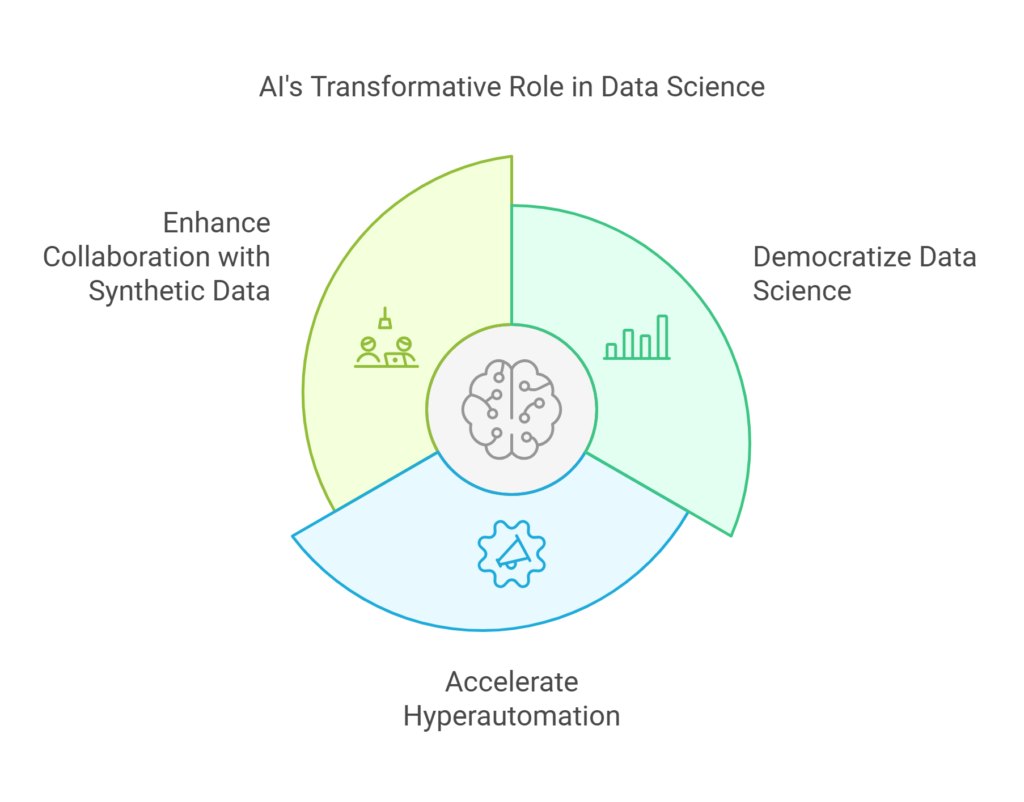175 zettabytes of data will be generated annually by 2025 all across the world.

The exponential increase in data led by advanced technologies and devices is making the role of data scientists more crucial. From the use of autonomous devices to agentic AI, a huge amount of data is being generated that needs to be structured to garner invaluable insights.
According to IDC, 175 zettabytes of data will be generated annually by 2025 all across the world. To analyze such an amount of data, AI can help data scientists in data collection, and preparation to extract insights for business growth.
Whether you are a data scientist looking to simplify your work or just curious about how AI works in data science, this article must be your perfect read. You will explore how AI can be used in data science, how it is going to be a go-to tool for data scientists, Is AI really does the work of a data scientist, and how the future looks for AI in data science.
The article will also delve into what data scientists expect from AI in data science in 2025. So, let us get started.
Also Read: Going Green: Top 10 Green Data Center Companies in India and World
How AI Can Be Used in Data Science
Artificial Intelligence (AI) has transformed the way data scientists perform. Data science typically involves data collection, data processing, and data visualization. AI redefines all these data extraction processes by automating data processing and enhancing data exploration.
AI allows data science professionals to optimize model building, and facilitate real-time data analysis, visualization, and reporting.

There are a wide range of AI tools that help data scientists such as DataRobot, Alteryx, Tableau, Google Cloud AutoML, Apache Kafka, AWS Kinesis, and Qlik Sense.
How AI is Going To Be a Go-To Tool For Data Scientists
Artificial Intelligence (AI) has become indispensable for data science, allowing data scientists to increase efficiency by handling larger datasets. They can leverage AI tools like OpenAI’s GPT models and Amazon Comprehend to simplify complexities through unstructured data, such as text and audio.
Can AI Replace Data Scientists?
Over the last few years, there has been a question around can AI replace data scientists. However, many state that it is not going to happen soon and may have a certain impact on data science professionals as AI has already taken on various data-related tasks.
Industry experts believe that AI can work as an enabler and professionals must upskill themselves to work with this new-age technology. They also notice that AI may lack contextual understanding and domain expertise and this is where data scientists showcase their expertise.
This is already evident in how AI automates routine, mundane tasks freeing up professionals to focus on more creative work. Although AI systems can perform code-heavy roles, they require human oversight for ethical use and to make unbiased decisions that align with an organizational goal.
Also Read: The Next Wave: Top Digital Transformation Trends Driving Industrial Evolution
How The Future Looks for AI in Data Science
As we have entered 2025, industry experts believe that the year holds immense potential for data scientists. AI is poised to redefine how data scientists work and how organizations derive value from data. AI is expected to:
- Democratize Data Science
- Accelerate Hyperautomation
- Enhance Collaboration with Synthetic Data

There is also a concern about how AI systems will address privacy and transparency challenges, and enhance the trustworthiness of their use. The year will also see how professionals and organizations use AI frameworks that will adhere to evolving regulations for their ethical use to ensure fairness and accountability.
What is For Data Science in 2025?
Advancements in AI will continue to evolve which revolutionizes almost every field, and data science is no exception.
- Data scientists will witness improved usability as AI tools become more user-friendly, simplifying the work with complex datasets.
- Data scientists will require AI systems that can handle exponential data growth without compromising performance.
- They must integrate AI systems into existing workflows to work cohesively across tools and platforms.
- There will be increased focus on AI tools that can adapt to specific business contexts can provide customized recommendations.
Also Read: Top 10 Artificial Intelligence (AI) Models Made Headlines in Recent Years
Sum Up
From advanced AI models to ethical AI practices, the data science field is undergoing an immense transformation. AI tools will provide data scientists with more powerful tools to make the most out of vast datasets.
Alongside enhancing the productivity and capabilities of data scientists, AI will also redefine their roles, especially towards strategic thinking and ethical AI deployment in the coming year.
Stay tuned to The Future Talk for more such interesting topics on Data Science.